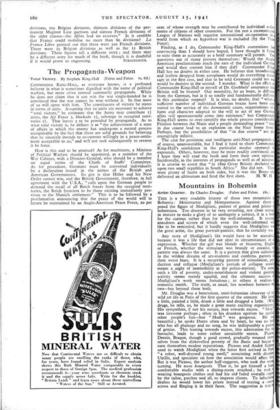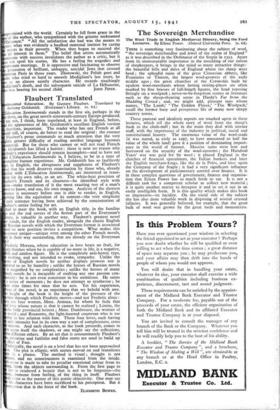Mountains in Bohemia
Artist Quarter. By Charles Douglas. (Faber and Faber. as.) Tins is a very readable history of those two mountains s Bohemia: Montmartre and Montparnasse. Against them posed the figure of Modigliani, painter of genius and prince d bohemians. Too discreet to be very revealing, not close enougl in texture to make a glory of so unshapely a subject, it is a book for the curious rather than for the well-informed. It records anecdotes and scenes of which even the well-informed vii like to be reminded, but it hardly suggests that Modigliani sva, the great artist, the great portrait-painter, that he certainly was.
Any story of Modigliani's life would have to be anecdotal, because it was a life that did not alter in circumstances or ia expression. Whether the girl was blonde or brunette, English or French, whether the stimulant was brandy or cocaine, in pattern was always the same. It is a pattern that gives substan3 to the wildest dreams of art-students and confirms parents is their worst fears. It is a recurring pattern of stimulation, pre, duction and collapse (Modigliani's periods of collapse usuallf meant a night of insensibility at the police-station). To sonic such a life of poverty, under-nourishment and violent painting activity seems merely squalid, and the ultimate, success Modigliani's work seems fortuitous ; to others it realises romantic zenith. The truth, as usual, lies nowhere between Os two—but beyond them both.
Mr. Douglas was a benevolent, semi-bohemian observer of wild art life in Paris of the first quarter of the century. He loved a little, painted a little, drank a little and drugged a little. (Win drugs, he tells, us, he made a great many .exciting experiments. His sympathies, if not his nature, lean towards excess. "Modi was tiresome perhaps ; often in his drunken egotism he spoild other people's fun—but " Modi " was gorgeous. He w
beautiful; spoke Dante often and by heart, he was no bird who has 11 plumage and no song, he was indisputably a paint of genius. This leaning towards excess, this admiration for farouche, leads to some rather unsuitable sneers. Picasso Derain, Braque, though a good crowd, gradually weaned then' selves from the dishevelled poverty of the Butte and began earn themselves modest reputations. Picasso and Andre Salo used to watch Modigliani when the latter first arrived in P " a sober, well-dressed young swell," associating with drunks Utrillo, and speculate on how the association would affect bin But it was Picasso, the author half-suggests, who took the wral turning. He went bourgeois. That is, he got himself a lard comfortable studio with a dining-room attached ; he took wearing bourgeois clothes and had his old faded overalls coPI by the tailor, patches and all, to impress clients. To infuriattl dealers he would lower his prices instead of tearing a can, across and flinging it in their faces. The suggestion is that
promised with the world. Certainly he fell from grace in the of the author, who sympathised with the grisette nicknamed 'Existence." All the satisfaction she had was the means to ress what was evidently a baulked maternal instinct by caring artists in their poverty. When they began to succeed she t all interest in them." The belief that artists automatically eriorate with success invalidates the author as a critic, but it not spoil his stories. He has a feeling for tragedies and ortunate meetings. It is oppressive and fascinating to observe procession of brilliant, unhappy, suicidal Jews that crossed emian Paris in those years. Zborowski, the Polish poet and er who tried so hard to smooth Modigliani's last years, he s as an almost saintly character. He records touchingly odigliani's death, and the subsequent suicide of La Hebuterne,
o was bearing his second child. JOHN PIPER.



























 Previous page
Previous page